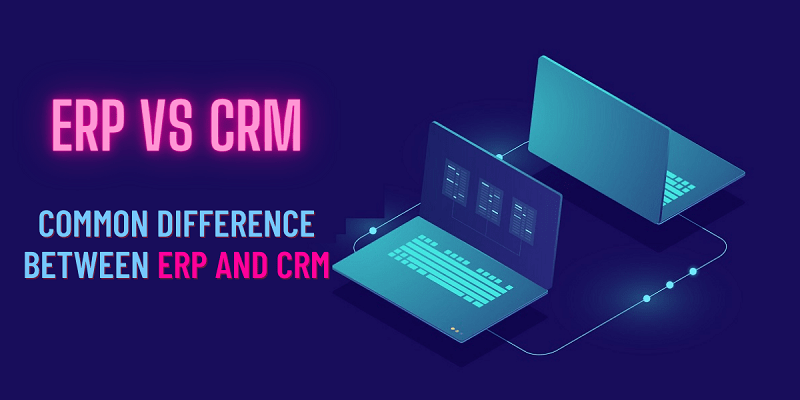

Businesses are often indecisive about CRM and ERP software capabilities. They often get confused between the two. When it comes to choosing between two, they do not understand the major difference between these software. Both the software focus majorly on revenue generation and simplifying the complexities. However, they both are different and we need to understand the difference. Through this blog, we will dive deep and take a closer look at what ERP and CRM software is so that we can decide between the two.
Enterprise planning software is a robust and enterprise-ready software that helps businesses to collect, store, manage and streamline business functions such as CRM, accounting, supply chain, procurement, human resources, marketing, and sales. By integrating all these business functions, an ERP centralizes the information and improve business efficiency of all the departments. Now, it is easy to enter information into the ERP system and easy to examine the problem areas of the business in real-time.
Today, the majority of the ERP systems are customizable and configurable. They allow users to meet their industry-specific requirements. An ERP software equipped with all these functionalities can handle both front and back-office operations. It can serve all the requirements of businesses of all types and sizes. Now it is easy to streamline processes, improve productivity and enhance business visibility and take informed business decisions.
CRM helps to record and store all the data related to prospects, leads, customer interactions and finally conversion. It also gives crystal clear ability as how many leads have been lost. It also examines the reasons for the same and provides keen insights and so much more. The core objective of a CRM system is to improve sales as well as boost customer satisfaction.
CRM is precisely used by the sales and marketing professionals to boost revenue and foster customer relationships. It can be used to create sales pipeline, maintain contact with clients, verify delivery addresses and also create invoices. CRM facilitates businesses to automate and manage redundant tasks, analyze buying patterns, identify new leads and streamline sales processes and so much more.
We now understand the role of ERP and CRM software. While ERP works on simplifying the business processes, CRM works on knowing and measuring the leads of the prospects and so much more. With a standardized report, CRM helps improve customer relationships and translates into increased profits. So, in a way, CRM is a subset of ERP. SAP Business One Cloud software can streamline the business processes of admin, sales, procurement, HR, production, warehouse, and many other operations.
As a business, you have different needs and priorities set. So, in future if you want to implement a solution that can take care of all customer aspects and leads, then you might want to consider CRM. Likewise, if you want to integrate all core business processes and have a single version of truth, you may want to invest in an ERP.
Read More – ERP vs CRM – Common Difference between ERP and CRM
So, the call is entirely yours to decide whether cloud based ERP or CRM fits best to your interest.
The way we consume entertainment has changed dramatically, with Subscription Video on Demand (SVOD) leading…
The Evolution of Inventory Tracking RFID inventory management software is transforming how businesses track, manage,…
The Unexpected Costs of Unprotected Windshields Polaris Ranger windshields protection is more than just a…
Probably one of the best things people do to secure their finances is the purchase…
The iPhone 15 is still a great buy Released in 2023, the iPhone 15 brought…
By Josh Breaker-Rolfe Data security posture management (DSPM) is the rising star of the data…